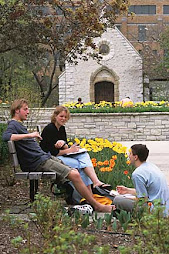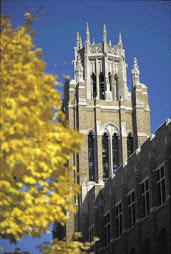“Be The Difference at Marquette”
“Marquette is located in Milwaukee, in the state of Wisconsin, in the west shore of beautiful lake Michigan in the north central of the United States. With 1.5 million residents, the Milwaukee metropolitan area is the largest urban center in Wisconsin and the 19th largest city in the U.S. It offers you the advantages of a metropolitan life without the major problems of the largest cities it’s a major American City with unique opportunities, friendly people and a thriving cultural scene."
Marquette’s Office of International Education offers an orientation program, focused advising and numerous social activities, all to help you feel at home.
*Marquette is ranked nationally in the top 100 American universities by U.S News & World Report.
*Marquette is among the “100 best values in private universities” by Kiplinger’s Personal Finance Magazine.
*Marquette has more than 11,000 students, including 425 international students from 75 countries.
Marquette offers over 60 programs in seven different colleges:
* Arts and Sciences
*Education
*Business administration
*Engineering
*Health Sciences
*Communication
*Nursing
Marquette Facts:
Location: Milwaukee, Wisconsin
Founded: 1881
Campus: Approximately 90 acres, plus 13-acre outdoor athletic complex
7, 923 undergraduates
11, 550 total students (including dental, graduate and law schools)
Students from every state of the United States and more than 75 countries
Annual expenses (2008-09)
Tuition:
$27, 720
Living expenses: Annual estimated costs for lodging, food, clothing, insurance, books and miscellaneous expenses are:
$13, 285 for the academic year
$2, 895 for the summer
Scholarship:
Merit-based scholarships for international students range from $5,000 to $ 13,000 per year depending upon previous student achievement.
A small number of additional awards are available for the most outstanding qualified students.
Merit awards are available for qualified candidates who transfer to Marquette from junior colleges or Jesuit secondary schools around the world.
Transfer Credit:
Credit toward a Marquette degree may be granted for studies completed in approved academic programs such as the international Baccalaureate, Advanced Level or post-secondary programs available in many countries”
Background/ History:
Marquette was named like this in honor of Père Jacques Marquette, who was a Jesuit priest from France, he was a famous explorer in this region in the 17th century. For several hundred years, had been known for the great and high quality of their educational systems and their great qualified institutions, and this “tradition of educational excellence”, continues today in Marquette.
In 1848, Wisconsin became the 30th state of the United States of America. 33 years later Marquette University was founded as a small liberal arts college.
Since that beginning 125 years ago Marquette has become a “nationally ranked private university”.
Facilities:
Central mall: one of the university’s most famous landmarks, it’s used as a place for worship and reflection for students.
In the dorms we offer you:
*Free cable TV access in every room.
*Wireless access.
*24-hour-front-desk service
*Professional and students staffs: hall directors, residence assistants and hall ministers.
*Spatiality living options: engineering, nursing, study-intensive and CommUNITY floors.
*Stores stocked with snacks.
Some special interests are:
*Art Club
*Chess Club
*Club Paintball
*Debate Team
*Graduate Student Organization
*Marquette Television
*Marquette Radio
Marquette Biking Club
*Etc…
We have many sport clubs, some examples:
*Basketball
*Football
*Soccer
*Softball
*Squash
*Tennis
*Wrestling
*Etc…
Club Sports:
*Baseball (M)
*Bowling
*Cycling (Coed)
*Football (M)
*Hockey (M)
*Running (Coed)
*Water skiing & Wakeboarding (Coed)
*Etc…
Student Graduation Demographics
How many students graduated at Marquette University?
Men Women Total
Non Resident Alien
16 10 26
Black Non-Hispanic
28 36 64
Hispanic
31 41 72
Asian / Pacific Islander
33 50 83
American Indian / Alaskan Native
2 2 4
White Non-Hispanic
639 787 1,426
Race Unknown
N/A N/A N/A
Total 749 926 1,675
All this was taken from Marquette’s brochures for promotion
------------------------------------------------------------------------------------------------------------------------
DIFFERENCES BETWEEN COLLEGES AND UNIVERSITIES:
COLLEGE
Is a term used to denominate an educational institution, it has different meanings all around the world here are some of the most relevant ones:
In United Kingdom:
* It is used to name some private schools
*Some institutes of high-school education
*Parts that constitute some universities
*Other types of education beyond the traditional system
In the U.S:
*It has a more reserved definition than in the United Kingdom
*The term is reserved for High Education institutes (often independent)
* they can offer degrees, both undergraduate and postgraduate themselves.
* In practice, there is no difference between the names: University or College, although originally the institutions of many colleges and graduate schools are called universities, and smaller ones with a few specialties, are called college.
*Some institutions have maintained the name college for historical reasons even granting degrees in a variety of areas and levels.
UNIVERSITY
According to the dictionary the term university is used to denominate:
1. - An institution for higher learning with teaching and research facilities constituting a graduate school and professional schools that award master's degrees and doctorates and an undergraduate division that awards bachelor's degrees.
2.-The buildings and grounds of such an institution.
3.-The body of students and faculty of such an institution.
4. - Is an institution of higher education and research, which grants academic degrees in a variety of subjects.
The word university is derived from the Latin universitas magistrorum et scholarium, roughly meaning "community of teachers and scholars".
It is generally composed by an Arts and a Science.
It differs from a college in:
*It has a bigger program
* the institution area is bigger
* offers advanced degrees in addition to undergraduate degrees
* provides both: undergraduate and postgraduate education.
-------------------------------------------------------------------------------------
PUBLIC VS PRIVATE UNIVERSITIES
HERE I SHOW YOU ALL THE INORMATION ABOUT EACH ONE.
I HOPE IT HEKPS YOU TO DECIDE THE BETTER CHOICE FOR YOU AND YOUR BUDGET
AND REMEMBER: ALWAYS THINK ABOUT FUTURE, WHO YOU WANT TO BE, AND WHAT DO YOU WANT TO DO WITH YOUR LIFE. GOOD LUCK!
*PRIVATE UNIVERSITY: Is not operated by governments though they may or may not receive funding (depending upon the nation and university).
Depending on the region, private universities may be subject to government regulation, it doesn´t matter it is an apart institution every educational institution needs always to be checked by the government in order for them to know it is functioning in the correct way and that students are in an environments which is appropriate for them in many different ways.
Private universities are common in some countries but do not exist in others, this is because the cost is superior depending the school, but it really values it because student´s have a lot of good references when they go to search job, always a private school is better recommended and better source when you need it to get an important job, they´re searching for people who knows the world we’re living in and that can handle the pressure, university prepares you for it.
Extra Data: In the U.S., a lot of prestigious universities and colleges are private.
Some private universities are affiliated with religious organizations and some others are operated directly by some religious organizations.
Some disadvantages are:
* Some private Universities, like proprietary colleges, are not accredited, and sometimes their degrees are not recognized in a formal way.
* Tuition fees at private universities are higher than at public ones but don’t worry about it because many private universities offer financial aid for their students to afford it.
*Some private universities tend to discrimination, in the way that they focus in secondary factors that have nothing to do with academic performance.
Tuition and room and board at private colleges is now in more than $30,000 a year on average. Some universities provide substantial assistance to low-income students. Still, but the dollar amounts are very high now days.
Here I put you an interview to Mr. Helm (President, Muhlenberg College)
“The better, the more prestigious the institution, the more you have small classes and you have direct interaction with your professors,” he said.
Students may more easily get into courses they want at private colleges, Mr. Helm said. “If you’re not going to graduate in four years because you’re not going to get the courses,” then a public education may not be the best choice.
*PUBLIC UNIVERSITY: Is a university that is funded by public means through a national or subnational government, it is the “enemy” of private universities.
A national university can be considered public, it depends on the region it’s located.
In every state at least one university has the state’s name
Did you know:
*That the largest states have more than thirty?
* Many U.S. public universities began as teacher training and they were eventually expanded into what is now called comprehensive universities.
* States are generally charging higher tuition to out-of-state students (this has been punished by the Supreme National Court.)
*Historically many of the prestigious universities have been private?
*Public universities give you a lot more opportunities they are not as highly selective as public ones,
*Discrimination rate in this schools is lower than in private institutions.
* State support of public universities has dramatically decreased, this has forced many public universities to search and ask for private support.
Here an interview to:
"Ms. Balbach, 18, a freshman, said she got a good deal at Indiana State, in Terre Haute, thanks to a pair of scholarships covering most of her costs. She does not think she is missing anything by choosing a public institution.
Her scholarships cover $12,396 for tuition, room and board; Ms. Balbach has paid a few hundred dollars for books and other expenses. She plans to major in insurance and risk management.
This whole agenda was lined up for me, when I saw it I thought, "Wow", she said."
And for the end of this section the opinion of:
F. KING ALEXANDER, President, California State University
"Anyone asking Mr. Alexander whether a private college education is worth its price gets an unequivocal answer."
“The answer is no,” Mr. Alexander said, adding that high price does not mean high quality. “A lot of schools, particularly up in New York and New England, they want everybody to believe that.” He described what he called the Chivas Regal effect in which, he said, “the bottle looks great, but what’s inside doesn’t taste better.”
Sources:
http://en.wikipedia.org/wiki/Private_university
http://www.nytimes.com/2006/12/13/education/13voices.html
http://www.nytimes.com/2006/12/13/education/13voices.html?_r=1&pagewanted=2
http://www.answers.com/topic/university
http://en.wikipedia.org/wiki/University
http://www.marquette.edu/oie/intl_costs.shtml
------------------------------------------------------------------------------------
domingo, 24 de mayo de 2009
Suscribirse a:
Enviar comentarios (Atom)



















.bmp)





















No hay comentarios:
Publicar un comentario